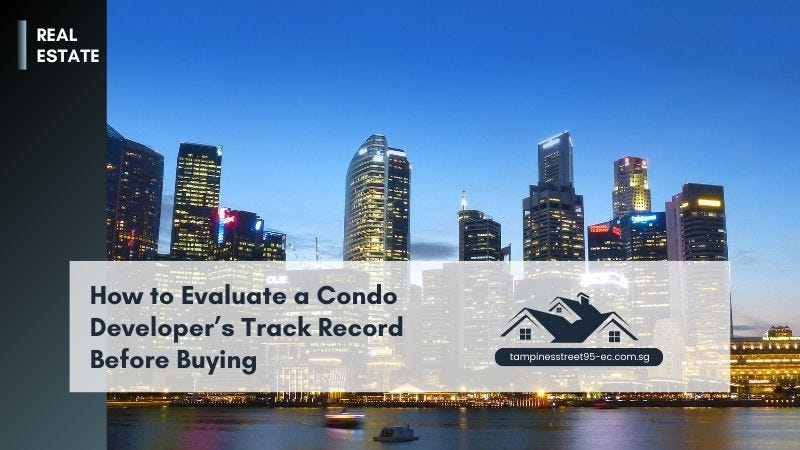How to Evaluate a Condo Developer’s Track Record Before Buying
So, you're thinking about buying a condo. Maybe it’s your dream home or maybe it’s an investment for rental income. Either way, one of the smartest things you can do is to evaluate the developer’s track record before signing on the dotted line.
In Singapore, condos are often launched off-plan—meaning you’re putting your money down on something that doesn’t exist yet. That’s why the developer behind the project matters big time. A reliable developer means better construction quality, timely delivery, and a good resale or rental value.
Let’s break down the simple steps to help you evaluate a condo developer like a pro.
1. Research Their Past Projects
The best way to predict the future is to look at the past. Start by checking out the developer’s previous completed projects. Did they deliver on time? Were there any issues like major defects or project delays?
Visit those older condos if you can. Look at:
Quality of the finishing
Common facilities (pool, gym, car park, etc.)
General upkeep after handover
Well-maintained past developments usually indicate a developer that doesn't cut corners.
2. Check Public Reviews and Forums
Singaporeans love sharing their experiences online—especially in forums like HardwareZone, Reddit, or Facebook property groups. A quick search can uncover whether the developer has a good or poor reputation.
Look out for:
Complaints about defects or delays
Praise for good workmanship or after-sales service
Comments on how responsive the developer was to buyer concerns
These real-life experiences offer insights you won’t find in sales brochures.
3. Look Into Their Financial Stability
A strong financial background is crucial. Developers who are financially secure are more likely to complete a project on time without compromising quality.
Here’s what you can do:
Google news articles about the developer
Check if the company is listed on the stock exchange (SGX)
Look at past financial statements if available
Avoid developers who are constantly in the news for project delays, lawsuits, or cash flow problems.
4. Compare Promises vs. Reality
Developers love to show off beautiful showrooms and flashy artist impressions, but how often do they match the real thing?
To know whether a developer delivers what they promise:
Compare the brochure or 3D renderings of their older projects to actual photos
Ask existing residents if they got what was promised
Look at the quality of actual unit finishes (e.g., flooring, kitchen fittings, bathroom tiles)
You’d be surprised how many cut corners after collecting the down payment.
5. Evaluate Their Project Portfolio
Some developers focus only on high-end condos, while others specialize in executive condominiums (ECs) or mass-market homes. Knowing what they’re good at helps you set the right expectations.
For instance:
CapitaLand is known for luxury, high-quality finishings.
Sim Lian focuses on practical, family-friendly layouts.
Frasers Property tends to deliver strong mid-tier projects.
If you're looking into executive condos, look at developers experienced in that space—this ensures better planning, smoother construction, and targeted amenities.
A great example of a well-planned executive condominium is detailed in the Tampines Street 95 EC Site Plan. It gives a clear picture of the thoughtful layout, amenities, and open spaces designed for modern families.
6. Look at Awards and Recognition
Developers who consistently win awards for design, sustainability, or innovation are usually serious about quality. While awards aren’t everything, they give you an idea of the company’s industry standing.
Look out for:
BCA Green Mark Awards
FIABCI World Prix d’Excellence Awards
Asia Property Awards (Singapore)
This also tells you that the developer pays attention to long-term sustainability and not just short-term gains.
7. Check HDB or URA Records
Did you know you can verify a developer’s profile through official records?
HDB's website often lists EC developers and their license status.
URA’s site provides updates on licensed developments and sales information.
You can also verify if the developer is listed under CORENET (Building and Construction Authority) for project approvals.
It’s a simple step but gives you that extra layer of assurance.
8. Review Their After-Sales Service
Once the condo is completed and you get your keys, the relationship with the developer doesn’t just end. The Defects Liability Period (DLP)—typically one year—means the developer is responsible for fixing any workmanship issues.
A good developer:
Responds quickly to defects
Has a proper reporting system for homeowners
Works with reliable main contractors and managing agents
If you hear horror stories about unresponsive support, that’s a red flag!
9. Visit Their Showflat and Talk to Agents
Don’t underestimate what you can learn from a simple showflat visit. Ask the agents tough questions:
Who is the main contractor?
What materials are used?
What happens if the project gets delayed?
Also, observe the professionalism of the sales team. Good developers train their agents well and are transparent with buyers.
Final Thoughts
Buying a condo is one of the biggest decisions you'll make—so make sure you're working with a developer who has a solid track record. Do your homework, visit their past projects, and check out online reviews. A strong developer will not only deliver your dream home on time but also ensure good quality, better facilities, and lasting value.
Projects like the Tampines Street 95 EC stand out because they reflect the planning, expertise, and reliability that experienced developers bring to the table. By studying the Tampines Street 95 EC Site Plan, you can see how quality design and thoughtful layout play a key role in a condo’s long-term value.
Don’t rush. Take your time, ask the right questions, and choose wisely. Your future self will thank you!

